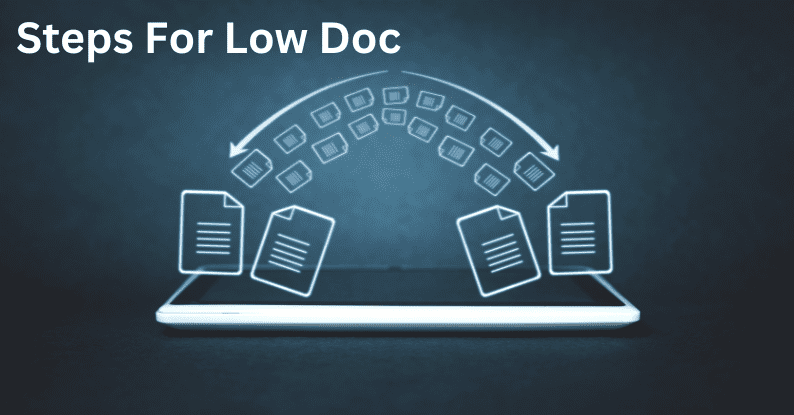Discover how the Reserve Bank of Australia's (RBA) decision to...
Read More
Low-doc car loans are your answer if you’re self-employed and need a car loan with minimal paperwork. This article will explain what these loans are, who they’re for, and how to apply, simplifying the process for busy professionals.

Low-doc car loans cater to self-employed individuals and business owners who struggle with the extensive documentation traditional loans demand. This type of car loan requires minimal paperwork, typically just a signed privacy form and proof of identification, making the process faster and more efficient. This ease of application is a significant relief for busy business owners, especially when considering private car loans and private sales.
These loans are particularly beneficial for those struggling with standard income verification. Freelancers and small business owners with irregular income or those who reinvest profits may lack the traditional proof of income needed for a regular car loan. Low-doc loans fill this gap by requiring minimal documentation, resulting in quicker approval times and faster access to financing, especially for those considering a doc loan or a full doc loan.
The streamlined process saves time and reduces the stress associated with car shopping. Imagine being able to focus on selecting the perfect vehicle for your business needs rather than getting bogged down in endless paperwork. Low-doc car loans enable a swift transition from application to approval, allowing you to drive away in your new vehicle with minimal hassle.
Meeting specific criteria is necessary to qualify for a low-doc car loan. These loans are primarily tailored for self-employed individuals and businesses with an active Australian Business Number (ABN). Most lenders require this ABN to have been active for at least one to two years, establishing a track record of business activity. Additionally, applicants must be Australian citizens or permanent residents to be eligible.
Another key requirement is proving that the vehicle will be used for business purposes. The vehicle must be utilized for business activities at least 51% of the time for business use. This confirms that the business car loan supports business operations rather than personal use. Documentation requirements often include financial and credit information. Some lenders might also need evidence of GST registration, indicating a higher annual turnover.
Creditworthiness plays a significant role. A good credit score, generally above 660, is necessary for qualifying. Although not mandatory, offering a deposit can improve your approval chances. Preparing these documents and understanding the eligibility criteria can set you on the right path to securing a low-cost car loan.
Opting for a low-cost car loan offers numerous benefits, especially for self-employed individuals and small business owners. A significant advantage is the simplified application process. These loans make it easier for business owners to access funds without comprehensive income verification. The simplified process leads to faster approval times, letting you focus on your business rather than paperwork.
Another significant benefit is the potential for tax deductions. Interest payments and related vehicle expenses are often tax-deductible, offering more interest financial relief. This can significantly help manage business finances by reducing overall tax liability.
Additionally, low-doc car loans offer customizable loan terms and repayment plans to fit your business’s cash flow needs. For example, balloon payments can help maintain cash flow by reducing monthly repayments and facilitating easier upgrades to newer vehicles.
Low-doc loans are versatile and can be used for various business purposes, whether for daily operations or specific activities. This flexibility ensures that you can get the vehicle you need without the constraints of traditional loan requirements. These benefits make low-doc car loans attractive for self-employed individuals looking to finance their business vehicles efficiently.
Estimating monthly repayments on a low-doc car loan is crucial for effective financial planning. A car loan calculator lets you input the loan amount, term, and interest rate to estimate your monthly repayments. This helps you understand the financial commitment and ensures you can manage repayments without straining your business finances.
Several factors impact these calculations: loan amount, term, and interest rate. For example, a higher loan amount or longer loan term generally results in higher monthly repayments. Conversely, opting for a shorter term or lower loan amount can reduce your monthly obligations.
Understanding these dynamics helps you make informed decisions that align with your financial capabilities.
Balloon payments play a crucial role in managing your low-dog car loan repayments. A balloon payment refers to a large sum that must be paid at the end of a loan term. It is typically much higher than previous payments made during the loan period. Opting for balloon payments can significantly lower your monthly repayments, making cash flow management easier. This is particularly beneficial for businesses that may experience fluctuating income throughout the year.
However, it’s essential to be mindful of the substantial amount that will be owed at the end of the loan term. Proper planning ensures you can either pay off the balloon payment or refinance it when due. This strategy helps maintain financial stability while enjoying the benefits of a newer vehicle for your business.

Applying for a low-doc car loan is straightforward and can be completed in minutes. Start by filling out an online application, which typically takes under two minutes. Alternatively, applying over the phone usually takes about five minutes. After submitting the application, upload the necessary documents via computer or smartphone, making the process highly convenient.
Automated finance technology matches applicants with suitable lenders based on their profile, ensuring optimal loan terms in the same way it streamlines approval, offering quicker turnaround times compared to traditional financing options.
Once approved, you can often drive away with your newer car within a day. This efficiency is a major advantage for busy business owners needing to get the best deal on a new car and get back on the road quickly.
Improving your chances of approval for a low-doc car loan involves several strategic steps. Maintaining a good credit score is crucial. A poor credit score can significantly reduce your chances of loan approval. Being asset-backed, such as owning property, can lower the perceived risk for lenders, increasing your likelihood of securing the loan.
Separating your business and personal bank accounts is another effective strategy. This separation helps lenders assess your financial situation more accurately, benefiting loan approval. Regular bank statements and deposits indicate a stable income, which is crucial for securing loan approval. Establishing a budget for business expenses can prevent overspending and ensure manageable loan repayments.
Regular financial reviews are essential. Tracking your cash flow helps you make informed decisions about future borrowings. Paying off existing debts and refraining from new credit inquiries can enhance your credit score before applying. These tips can significantly improve your chances of approval for a low-doc car loan.

A finance broker can simplify obtaining a low-doc car loan. Brokers act as intermediaries between borrowers and lenders, leveraging industry relationships to find the best loan options. They access a wider variety of loan products than dealerships, enabling better loan terms and interest rates in car finance.
Brokers negotiate more favourable loan terms and interest rates by leveraging relationships with multiple lenders. They assist with the entire application process, making it less daunting for borrowers unfamiliar with the requirements. Consulting a finance broker can improve your chances of meeting documentation requirements and securing a loan structure that fits your financial situation.
For self-employed individuals, working with a broker is particularly beneficial. Brokers understand the unique challenges business owners and sole traders face and provide tailored advice to navigate the loan application process for a self-employed applicant. This support is invaluable in securing the best possible loan for your needs, especially for self-employed people.
Sound financial practices are crucial for self-employed individuals seeking a low-doc car loan. A common oversight is failing to consider potential future changes in financial situations, which could impact loan repayments. Evaluating your financial health, including expenses and debts, before applying for a loan is essential.
Budgeting for insurance costs is another critical aspect often ignored. Failing to account for these costs can lead to financial strain post-purchase. Seeking financial advice from experts helps avoid common mistakes and make informed decisions. An accountant’s letter confirming income verification is typically required when applying for a low-doc car loan, ensuring your financial position is accurately represented.
Regular financial reviews and maintaining a clean credit history are essential. These practices help track your cash flow and ensure that you are in a stable financial position to take on new loans. By following these practices, you can improve your chances of securing a low-cost car loan and maintain financial stability.
When applying for a low-cost car loan, there are common mistakes you should avoid to ensure a smooth process:
Rushing through the application process and providing inaccurate information can result in delays or denials. Taking the time to gather accurate information and complete the application carefully is crucial.
Additionally, choosing a lender without proper research can result in high fees and unfavourable loan terms, increasing the lender’s risk. Conducting thorough research on different lenders can help you find the best loan for your needs.
Navigating the world of low-doc car loans can be a game changer for self-employed individuals. These loans offer a streamlined application process, faster approvals, and flexible repayment options tailored to your business needs. By understanding the eligibility criteria, benefits, and application steps, you can make informed decisions that align with your financial goals. Working with a finance broker and maintaining sound financial practices can further improve your chances of securing the best loan terms. Avoiding common mistakes and conducting thorough research will ensure you get the most out of your low-doc car loan, driving your business forward with confidence.
A low-doc car loan is intended for self-employed individuals and business owners, requiring minimal documentation to streamline the approval process. This allows for a quicker and easier path to financing a vehicle.
To be eligible for a low-doc car loan, you must have an active ABN, be an Australian citizen or permanent resident, use the vehicle for business purposes, and maintain a good credit score.
Choosing a low-doc car loan offers a more straightforward application process and customizable loan terms, making it a flexible option for those who may not have traditional documentation. This can also lead to potential tax deductions, enhancing the financial benefits.
To improve your chances of getting approved for a low-doc car loan, focus on maintaining a good credit score and ensure you are asset-backed. Additionally, keep your personal and business finances separate and regularly review your financial situation.
Working with a finance broker for a low-doc car loan is advantageous because they can navigate a broader range of loan products and negotiate favourable terms on your behalf, simplifying the application process. This expertise can ultimately lead to a more beneficial financing experience for you. At Triple O Finance, our car loan experts can help you easily navigate the complexity of securing the right car loan. Contact us for a free assessment.
Discover how the Reserve Bank of Australia's (RBA) decision to...
Read MoreConfused about how much deposit you need for your first...
Read MoreMastering Investing in Property with SMSF: Best Practices and Insights...
Read MoreVictoria’s 2025 land tax reforms are reshaping the property landscape—affecting...
Read More